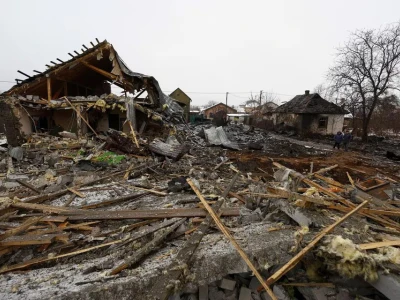
Ukraine says growing advance into Russia creates buffer zone
Russia says it has already evacuated around 200,000 people from the border zone.
KYIV, Aug 14 (Reuters) - Ukraine's forces advanced further into Russia's Kursk region on Wednesday as Kyiv said the territory would serve as a buffer zone to protect its border areas from Russian attacks.
Kyiv's surge into Russian territory last week caught Moscow by surprise and has, for now at least, changed the mood of a war in which the Russian forces that began a full-scale invasion of Ukraine in 2022 had been grinding out steady gains all year.
Ukrainian President Volodymyr Zelenskiy met top officials to discuss the humanitarian situation and the possible establishment of military administrations in an occupied area that Ukraine says exceeds 1,000 sq km (390 sq miles).
"We continue to advance further in the Kursk region," Zelenskiy wrote on Telegram, "from one to two km in various areas since the start of the day. And more than 100 Russian prisoners of war in the same period."
Interior Minister Ihor Klymenko said the creation of a "buffer zone" was "designed to protect our border communities from daily enemy attacks".
Russia has been pummelling Ukraine with strikes launched from adjacent border territories, including from the Kursk region.
Ukraine complains of being hamstrung in defending itself against such attacks by the need to respect Western countries' compunction about using their weapons against Russia's hinterland rather than against its forces in occupied Ukraine.
Carving out a slice of the Kursk region - which Russia puts at less than half the area claimed by Ukraine - will help that cause.
Russian President Vladimir Putin has vowed to push out the Ukrainian troops, which he says are aiming, with Western backing, to give Kyiv a stronger hand in possible future ceasefire talks. But more than a week of intense battles have so far failed to oust them.
"The situation remains difficult," said Yuri Podolyaka, an influential Ukrainian-born, pro-Russian military blogger.
"The enemy still has the initiative, and so, albeit slowly, it is increasing its presence in the Kursk region."
Moscow said 117 Ukrainian drones had been shot down over Russia overnight, mostly in the Kursk, Voronezh, Belgorod and Nizhny Novgorod regions. It said missiles had also been downed, and showed Sukhoi Su-34 bombers striking what it said were Ukrainian positions in the Kursk region.
Later, the defence ministry said Russian forces had repelled a series of Ukrainian attacks inside the Kursk region, including at Russkoye Porechnoye, 18 km (11 miles) from the border, and some pro-Russian war bloggers said the front had been stabilised.
State television said Moscow's forces were turning the tide, showing footage of attacks on Ukrainian positions and evacuations of Russian civilians.
KURSK NUCLEAR PLANT SECURITY INCREASED
Some of the Ukrainian drones attacked four Russian military airfields in an attempt to undermine Russia's ability to attack Ukraine with glide bombs, a Ukrainian security source told Reuters on condition of anonymity. Ukraine's military also said it had destroyed a Russian Su-34.
Russia's National Guard said it was beefing up security at the Kursk nuclear power plant, located just 35 km (22 miles) from the fighting.
And in the Russian border region of Belgorod, governor Vyacheslav Gladkov declared a state of emergency.
Russia says it has already evacuated around 200,000 people from the border zone.
Ukrainian Deputy Prime Minister Iryna Vereshchuk said Kyiv would open humanitarian corridors for the evacuation of civilians, "both in the direction of Russia and in the direction of Ukraine".
Ukrainian officials said Kyiv would also arrange access for international humanitarian organisations, likely to include the International Committee of the Red Cross and the United Nations.
The unprecedented incursion carries major risks for Russia, Ukraine and the West, which is keen to avoid a direct confrontation between Russia and the U.S.-led NATO military alliance that has helped arm Ukraine.
U.S. President Joe Biden said U.S. officials were in constant touch with Kyiv over the incursion, although the White House said Washington had not received advance notice and had no involvement.
Russian officials say Ukraine's Western backers must have known of the attack. "Of course they are involved," lawmaker Maria Butina told Reuters.
The offensive could also leave Ukrainian forces more exposed on other parts of the front, where Russia has been slowly adding to the 18% of Ukrainian territory it now controls.
Ukraine's top commander, Oleksandr Syrskyi, said that the Russian town of Sudzha, a transhipment hub for Russian natural gas flowing to Europe via Ukraine, was fully under Ukrainian control. Natural gas was still flowing on Wednesday.
The Russian rouble weakened against the dollar on Wednesday, for a loss of over 8% since the start of the incursion.




